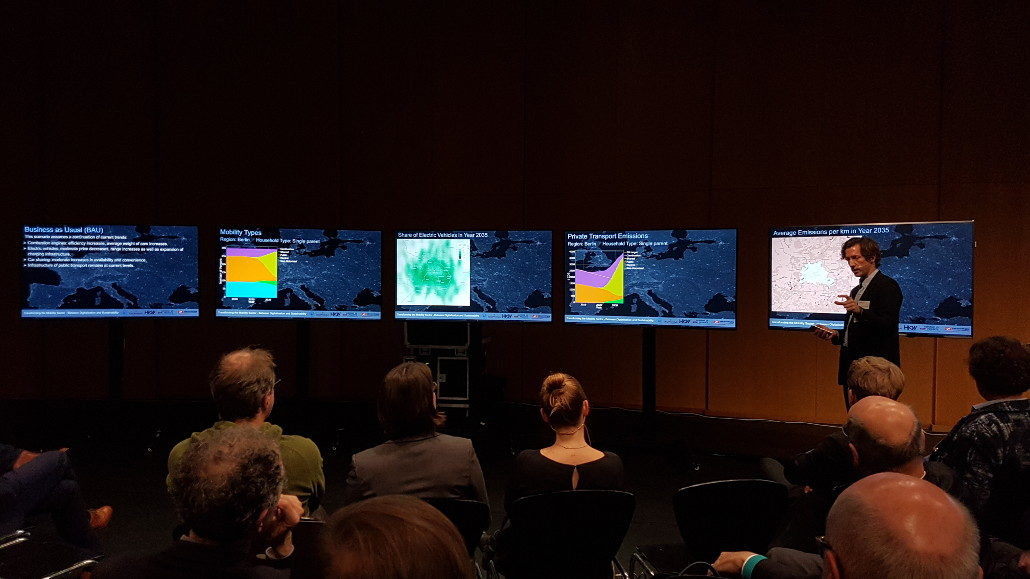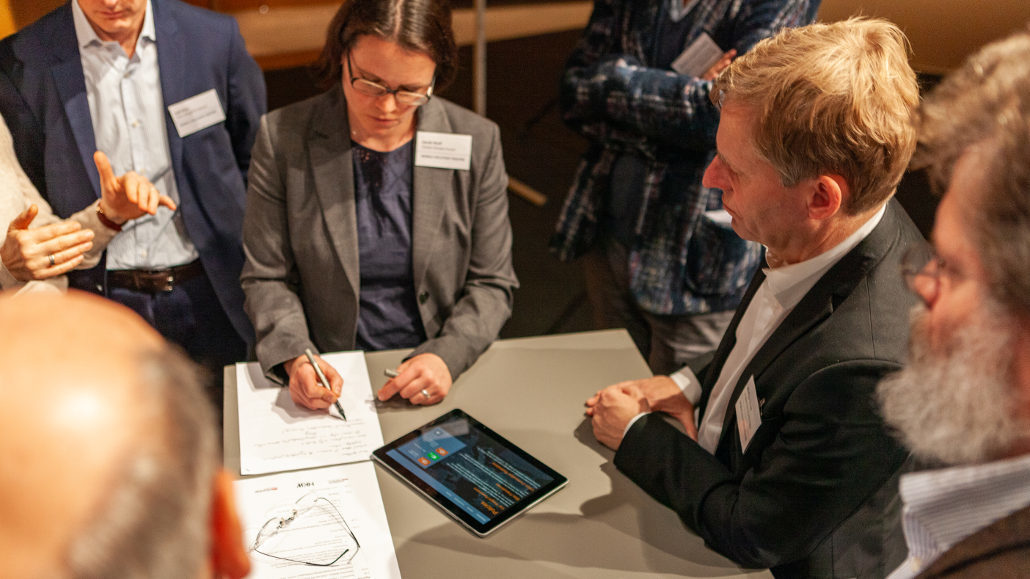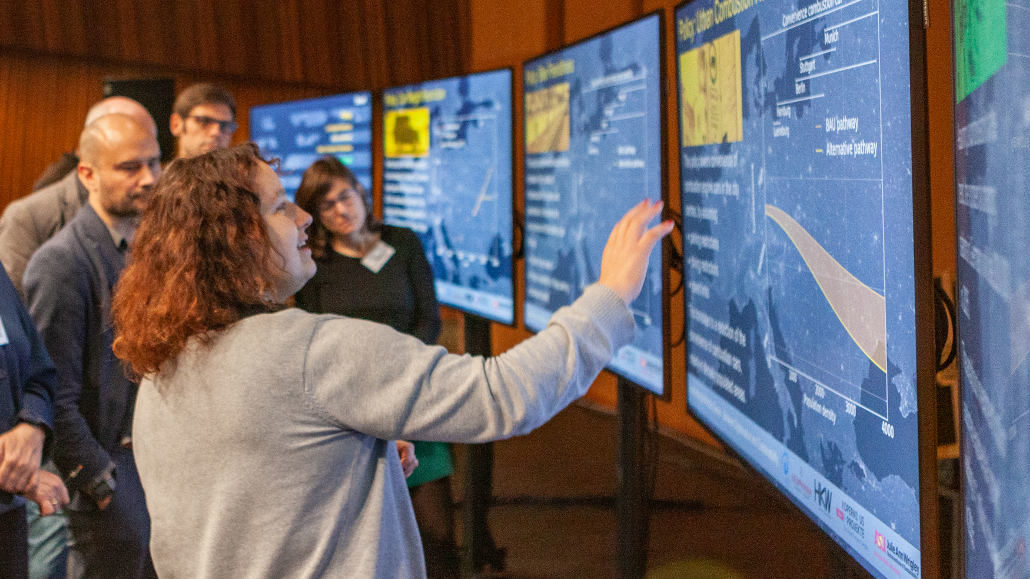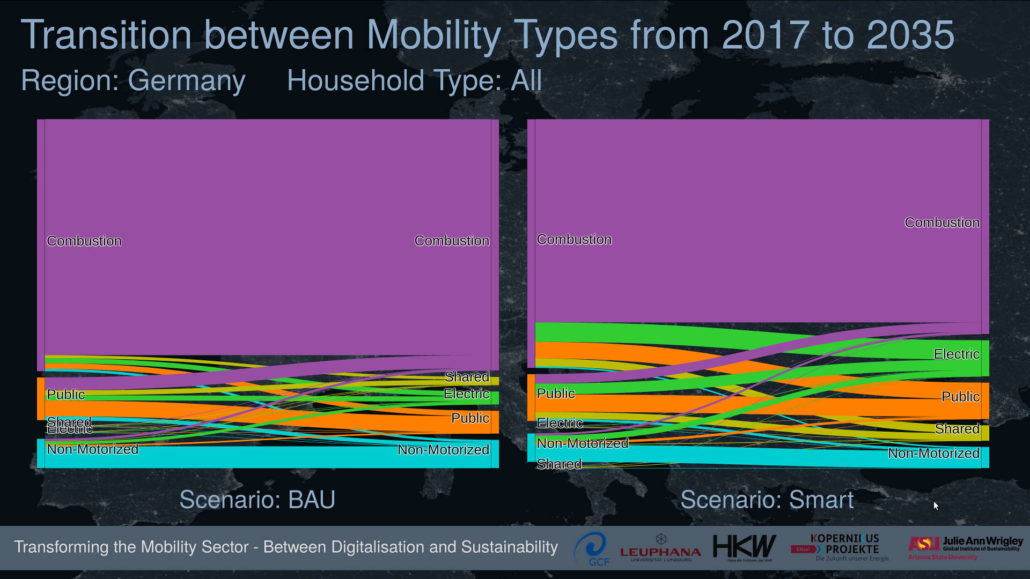DECISION THEATER
on SUSTAINABLE MOBILITY
by Carlo Jaeger and Jahel Mielke
On November 28, 2018, in the Haus der Kulturen der Welt in Berlin, we have realised the first Decision Theater on the role of mobility in the German energy transition, aka “Energiewende”.
“We” are the Global Climate Forum, Leuphana University, the Haus der Kulturen der Welt, the ENavi Kopernikus Project, and Arizona State University.
We have built on the Decision Theater methodology developed at Arizona State. This methodology supports group decision processes with data and simulations, displayed on large screens surrounding the group. The computer output changes depending on how the discussion progresses.


For the event of November 28, the original methodology has been refined in three respects. First, while the original methodology has been implemented in a stationary setting requiring massive investment, we have created a lean and mobile infrastructure. This allows to realize Decision Theaters on short notice wherever the relevant stakeholders may be.
Second, we have developed a multi-agent architecture where the stakeholders can identify with some of the agents. We have then used this architecture to develop the Mobility Transition Model MoTMo (the same architecture can be used to study other aspects of sustainability transitions).
Third, we do not present MoTMo as a finished product that creates an illusion of certainty and precision in situations calling for the capability to “expect the unexpected”. Therefore, we offer the model as a structure with which the stakeholders can experiment and that we modify in an on-going dialogue with them.
In this dialogue, questions like the following arise. What will millions of agents do when they are confronted with an electric mobility subsidy? Or with a restriction for heavy cars such as SUVs in cities? Some might change their mobility behavior and turn in their car for an electric vehicle, others will buy a smaller regular car for the city, while a number of agents might switch to car sharing or public transport.
Stakeholders from science, politics, civil society and business that came together in this innovative discussion format on November 28th at Haus der Kulturen der Welt in Berlin could interactively explore answers to these questions in the “Mobile Solution Theatre” created by the different institutions involved.


Based on the government targets to reduce GHG emissions in the mobility sector in Germany by 38 per cent until 2030, stakeholders discussed their ideas on the mobility transition using five interactive screens that showed different scenarios.
Stakeholders could zoom into the business-as usual scenario, leading towards higher emissions in 2035, and into a scenario where digitalization supported sustainability (smart green). They could see the effects of ten different policies, events and investment options, e.g. falling world market prices for electric vehicles or investment into bike infrastructure, on the mobility choices of households, on emissions and on the distribution of regular cars or electric cars in regions and cities.


Stakeholders were then able to create their own mobility transition scenarios, combining policies in different groups with tablets, and then analyzing their results interactively on the large screens.
The discussion focused on the social aspects of a mobility transition, asking to ensure that people who have less choice due to lower income are not disadvantaged, and that fewer cars, not only a replacement of conventional with electric vehicles, are important to transform our cities.
The zoom on the screens helped to discuss unintended consequences of policies, such as a higher supply of car sharing that increases emissions, because agents that formerly used bikes and buses jump on a car instead. Also, digitalization just by itself led to almost no reductions in emissions, and needed to be supported by other measures to enhance sustainability in the mobility sector.
The discussion in the “Mobile Solution Theatre” also led to feedback from stakeholders on the computer model behind the visualization as well as on the interactions between science and society.


While participants questioned assumptions and asked for more policy options, they acknowledged the value of such a tool in times of difficult discourses in society.
Instead of focusing only on facts and numbers, the “Mobile Solution Theatre” allows to create narratives based on scenarios that can broaden the knowledge space for decision-makers or citizens. Due to interactions with the model, stakeholders can in turn contribute to improving scientific results and methods.
We will continuously improve the Decision Theater approach to Sustainability Transitions in interactions with a broad range of stakeholders, stimulating creative discussions in different locations – ranging from town halls to big climate change conferences.
We have started with the mobility sector, and from there will stepwise proceed towards other challenges of sustainability transitions, such as the risks of crashes in computerised electricity markets or the challenge of inequality in sustainability transitions.
The next event with our Decision Theater on mobility will take place at Leuphana University of Lüneburg at the conference “Leverage Points for Sustainability Transformation” from Feburary 6-8.
Comments and inquiries are welcome at Beatrix.Opolka@globalclimateforum.org.


